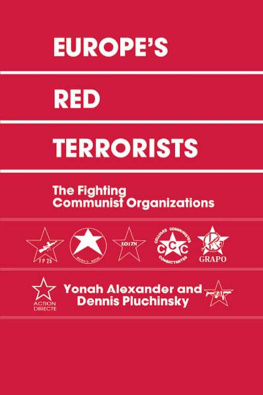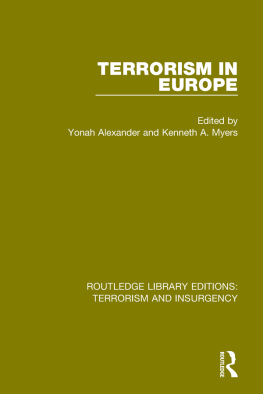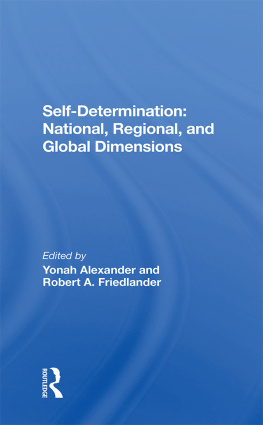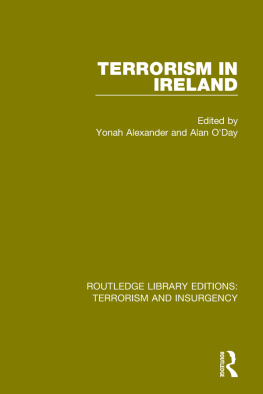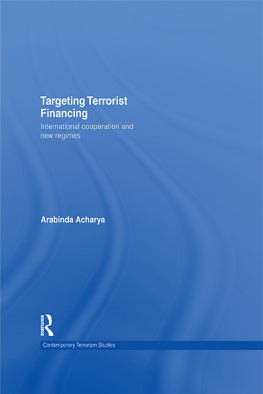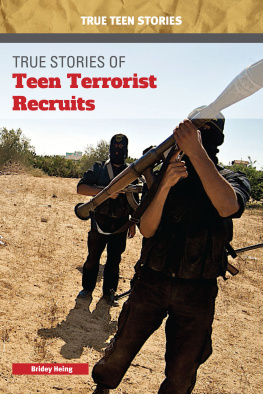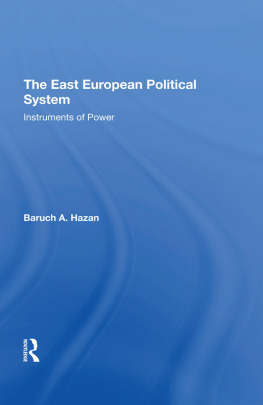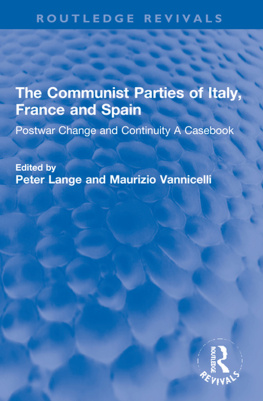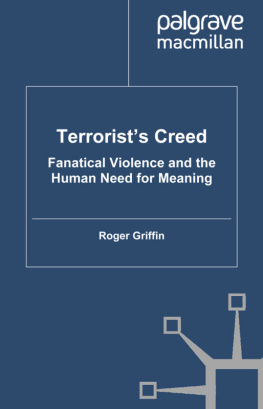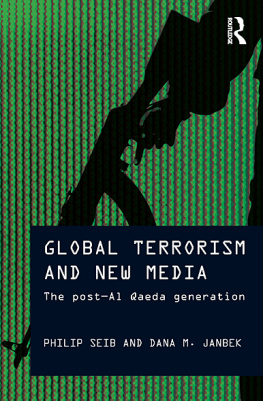First published in 1992 in Great Britain by
FRANK CASS AND COMPANY LIMITED
2 Park Square, Milton Park, Abingdon, Oxon, OX14 4RN
and in the United States of America by
FRANK CASS
270 Madison Ave, New York NY 10016
Transferred to Digital Printing 2005
Copyright 1992 Yonah Alexander and Dennis A. Pluchinsky
British Library Cataloguing in Publication Data
Europes Red Terrorists: Fighting
Communist Organizations
I. Alexander, Yonah
II. Pluchinsky, Dennis A.
332.4
ISBN 0714640883 (pbk)
ISBN 0714634883 (hbk)
Library of Congress Cataloging-in-Publication Data
Europes red terrorists : the fighting communist organizations /
edited by Yonah Alexander and Dennis A. Pluchinsky.
p. cm.
Includes bibliographical references.
ISBN 0714634883
1. TerrorismEuropeCase studies. 2. TerroristsEuropeCase studies. 3. CommunismEuropeCase studies. I. Alexander, Yonah.
II. Pluchinsky, Dennis A.
HV6433.E85E87 1992
303.625094dc20
9226147
CIP
All rights reserved. No part of this publication may be reproduced, stored in a retrieval system, or transmitted in any form, or by any means, electronic, mechanical, photocopying, recording, or otherwise, without prior permission of Frank Cass and Company Limited.
Typeset by Regent Typesetting, London
Introduction
Following an overview of the challenge of contemporary terrorism, this book examines a particular strain of terrorist group that is found primarily in Western Europe the fighting communist organization or FCO. For almost a quarter of a century, FCOs have caused political and security problems in Western Europe. Their terrorist campaigns have caused the deaths of scores of prominent and influential businessmen, politicians, judges, police officials, and military officers. Carrying the banner of Marxism-Leninism, these groups have sought to overthrow the democratic governments in their respective countries. Germany, Italy, France, Spain, Belgium, Turkey, Portugal and Greece have all, at one time or another, been confronted with an FCO terrorist threat. The urban terrorist activities of these groups have directly challenged the democratic institutions of these states and forced many of them to design special anti-terrorist laws to counter this growing threat.
The high-water mark for the FCO threat was reached in 1984 and 1985 when seven FCOs were active in six European countries. It was during these years that this FCO threat collectively was called the Euroterrorist threat as European governments feared that these groups were establishing an anti-imperialist alliance of West European terrorist groups. During the late 1980s, Italy, Belgium, France and Portugal neutralized the FCOs operating in their countries. In 1992, four FCOs are active in Western Europe: the Red Army Faction (RAF) in Germany, the Revolutionary Organization 17 November (17N) in Greece, the First of October Anti-Fascist Resistance Groups (GRAPO) in Spain, and the Revolutionary Left or Dev Sol in Turkey.
It was assumed that with the disintegration of the communist regimes in Eastern Europe and the former Soviet Union and the concurrent discrediting of the Communist Parties in these countries, that the European FCOs would encounter a serious ideological crisis leading to their dissolution. This has not happened. While Marxism-Leninism as a ruling ideology has been seriously damaged, it is still attractive as a revolutionary ideology. The RAF, 17N, GRAPO and Dev Sol continue to adhere to the principles and revolutionary strategy of Marxism-Leninism. Although no European FCO has ever achieved its goal of overthrowing a democratic government, and an objective analysis of the current economic, social and political conditions in Western Europe argue against the attainment of this goal in the near future, these FCOs can still cause political and security problems. They still have the ability to force themselves onto the domestic political agenda in their countries, especially Greece and Turkey.
It is also possible that FCOs may surface in Eastern Europe and the former Soviet Union. Dedicated communists still exist in this region. The current social, economic and political problems that are developing in this region should create a conducive environment for the emergence of neo-communist terrorist groups. If such groups form, they would most likely pattern themselves after the FCOs that have operated in Western Europe. Consequently, it is important to examine the European FCOs in order to understand what type of terrorist group may surface in Eastern Europe and the former Soviet Union in the mid-1990s.
This book was not designed to be an all-inclusive, detailed study of the European FCOs. To the authors knowledge, no such study exists. The intent was to compile a brief collection of documents (attack communiqus, ideological tracts, interviews, policy statements, etc.) written by the European FCOs so that the reader can obtain a general understanding of how these groups think and view the world about them. Brief profiles and chronologies of terrorist attacks of seven FCOs are provided as an introduction to the documents. These profiles and chronologies will give an idea of the preferred tactics and targets of these groups. Many of the FCO documents are being published in English for the first time.
The reader should be warned, however, that because these groups use specialized Marxist-Leninist and terrorist jargon, some passages in the documents may be hard to understand. There are more than enough comprehensible documents to allow the reader to obtain a clear understanding of the mindset and world view of the fighting communist organizations.
The authors wish to thank Xavier Raufer of the Institute of Criminology at the University of Paris for his help with the communiqus of Direct Action and Dev Sol. They also wish to acknowledge the assistance of Andrew Corsun for his insights into 17N and Dev Sol, and the help of the Bonn Institute for the Study of Terrorism for providing the minutes of a meeting between the RAF and Red Brigades in January 1988.
A number of research assistants, including James T. Kirkhope, Samuel Bently, Matthew Brown, Tim Cartwright, Paul Ginsburg, Christopher Harmel, Vickie Morriberon, Brian Thompson and Veronica Wiles, also deserve thanks for their help in preparing the manuscript for publication.
YONAH ALEXANDER
DENNIS A. PLUCHINSKY

